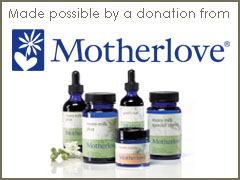Booby Traps Series: Six breastfeeding myths you might hear at the doctor’s office
by Tanya Lieberman, IBCLC | September 19, 2012 6:27 am
 This is the 56th post in a series on Booby Traps, made possible by the generous support of Motherlove Herbal Company.
This is the 56th post in a series on Booby Traps, made possible by the generous support of Motherlove Herbal Company.
Why there so many myths about breastfeeding, I don’t know. But I do know that our health care providers, who typically get poor or no training in breastfeeding management, are not a whole lot less likely to perpetuate them than anyone else.
Here are several myths about breastfeeding which I have heard directly from providers, or reported to me by moms. There are many, many more. Feel free to leave ones you’ve heard from your providers in the comments!
“Pumping will tell us how much milk you’re making.” A number of women have reported this one to me, having been sent home to pump or told to pump in the office (lovely) to “measure” their milk supply. Pumping output may have nothing to do with how much milk a baby is getting at a feeding, as my friend who successfully nursed twins but was never able to pump any milk will tell you. The truth, which most pumping moms can tell you and research confirms, is that pumping output can vary widely in comparison to breastfeeding. Not a great basis for evaluating milk supply and intake.
 “Breastfeeding was painful for her because she’s light skinned.” I thought that this one had died out a while back, but I heard it directly from a provider a few years ago.
“Breastfeeding was painful for her because she’s light skinned.” I thought that this one had died out a while back, but I heard it directly from a provider a few years ago.
“She started waking more at night? Probably time to start rice cereal in a bottle.” This one was reported to me in person by a mom whose 4 month old perfectly healthy exclusively breastfed baby was waking more at night, probably due to teething. Not only does this advice conflict with the AAP’s exclusive breastfeeding recommendation, starting solids to make babies sleep longer doesn’t work. Breastfeeding Answers Made Simple explains, “This popular belief appears to have no basis in fact. Two studies found no difference in the sleep patterns of babies after solids, such as cereal, were started. About the same number of babies began sleeping more at night whether they received the solids or not.”
“Feeding frequently can hurt you. Why don’t you feed her less?” I heard this from a family member, whose pediatrician told her to feed less despite the fact that she was not experiencing any pain. If all else is well (no pain due to a bad latch, thrush, infection, biting, etc.), feeding frequently in itself shouldn’t cause pain.
“He’s fussy? It’s probably because you’re eating…” This one came from a visiting nurse who was caring for a friend of mine. The nurse told her to avoid chocolate because it would cause fussiness in the baby. You may have heard the same about “gassy” foods, citrus, garlic, etc. Breastfeeding Answers Made Simple explains, “Fussiness and gassiness are normal during the newborn period and are unlikely to be caused by something in the mother’s diet…Even when a baby does react to a food in the mother’s diet, the specific food that causes a reaction will vary from baby to baby. So telling all breastfeeding mothers to avoid the same foods will do no good.”
“After a year, breastmilk has no real nutritional or immunological value.” This one I’ve heard reported my moms online a number of times, and it never ceases to amaze me. My favorite response: Does spinach spontaneously change from nutritious to junk food?
Unfortunately, this is just a small sampling of the myths moms sometimes hear presented as truth from their providers. What myths have you heard in your doctor’s office?
Source URL: http://www.bestforbabes.org/booby-traps-series-six-breastfeeding-myths-you-might-hear-at-the-doctors-office